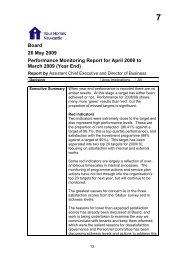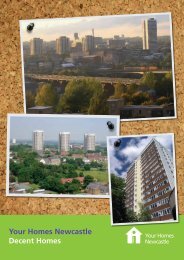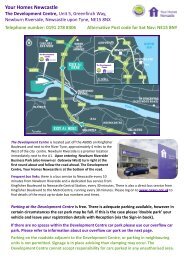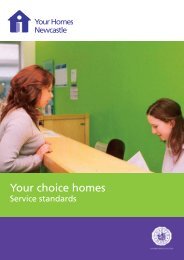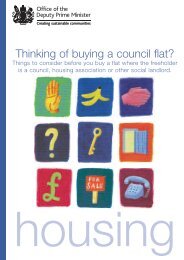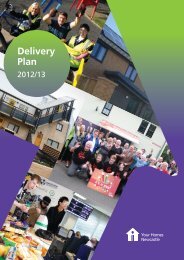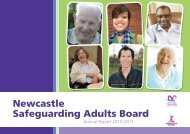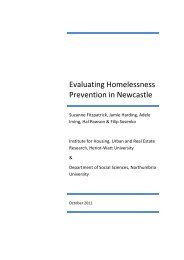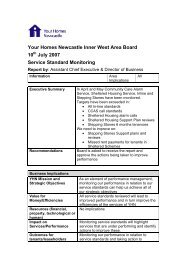Adaptations Service Policy - Your Homes Newcastle
Adaptations Service Policy - Your Homes Newcastle
Adaptations Service Policy - Your Homes Newcastle
You also want an ePaper? Increase the reach of your titles
YUMPU automatically turns print PDFs into web optimized ePapers that Google loves.
<strong>Adaptations</strong> <strong>Service</strong> <strong>Policy</strong><br />
March 2010
Version 1 – March 2010<br />
Due date for next review: March 2011<br />
Author: Helena Hammock<br />
Contact details:<br />
<strong>Your</strong> <strong>Homes</strong> <strong>Newcastle</strong><br />
YHN House<br />
Benton Park Road<br />
Tel: 0191 2788736<br />
Email: Helena.Hammock@yhn.org.uk<br />
3
Contents<br />
Page<br />
1. Introduction 6-9<br />
1.1 Background<br />
1.2 <strong>Policy</strong> statement<br />
1.3 Purpose of this policy<br />
1.4 Scope<br />
1.5 Eligibility<br />
2. Adaptation type 10-11<br />
2.1 Minor adaptations<br />
2.2 Removable adaptations<br />
2.3 Permanent adaptations<br />
2.4 Structural adaptations<br />
3. Fast track scheme 11<br />
4. Adaptation programme 12-15<br />
4.1 Request for minor adaptations<br />
4.2 Request for removable, permanent and structural adaptations<br />
4.3 Assessment (removable, permanent, structural)<br />
4.4 Prioritisation<br />
4.4.1 High priority<br />
4.4.2 Normal priority<br />
4.5 Authorising requests for adaptations<br />
4.6 Post installation quality check<br />
5. Refusing requests for adaptations 15<br />
6. Re-housing as an alternative to adaptations 16<br />
7. Maintenance and service 16<br />
8. Advertising of adapted property 16<br />
9. Adapted property register 17<br />
10. Recharging 17<br />
11. Removal of adaptations 17<br />
12. Transfers 17<br />
13. Right to buy applications 17<br />
4
14. Equality and diversity 18<br />
15. <strong>Policy</strong> review and performance monitoring 18-19<br />
15.1 <strong>Policy</strong> review<br />
15.2 <strong>Service</strong> standards<br />
15.3 Disabled Adaptation Programme Monitoring Group<br />
15.4 Satisfaction survey<br />
15.5 YHN Board<br />
16. Complaints and appeals 19<br />
16.1 Complaints<br />
16.2 Appeals<br />
17. Useful contacts 20<br />
Appendix<br />
1. Request for adaptation – process flow chart<br />
5
1. Introduction<br />
Currently 41% of people with a disability requiring specially adapted<br />
accommodation and 22% of people aged over 65 years living in England occupy<br />
rented social housing. To ensure that they receive the required level of care and<br />
support, social landlords must acknowledge the specific needs of these<br />
customers and provide for them accordingly.<br />
A number of our properties are occupied by elderly or disabled tenants. We want<br />
all our tenants to be able to live within their own homes as comfortably and as<br />
independently as possible. We recognise that in order to facilitate this, we must<br />
effectively and efficiently provide the right adaptations to the right people.<br />
There are currently more than 53,000 people aged over 60 years living in<br />
<strong>Newcastle</strong>; this represents just over 20% of the city’s population. Additionally,<br />
<strong>Newcastle</strong> has a relatively high proportion of disabled citizens. Therefore it is<br />
important that we do not only consider our current customers, but also our<br />
prospective ones.<br />
Currently 5632 of our properties are adapted, which is 19% of our total stock, and<br />
our <strong>Adaptations</strong> <strong>Service</strong> is performing well. However, we feel there are specific<br />
areas which require improvement if we are to achieve the overall aims of the<br />
service and ultimately contribute to achieving the organisation’s strategic<br />
objectives. These areas were recently highlighted within the Audit Commission<br />
Report (2008) and the Tribal review report (2008) (for further information on<br />
these reports please contact the <strong>Adaptations</strong> <strong>Service</strong> on 0800 091 1255). The<br />
Tribal review report specifically highlighted how financial pressures on the<br />
service were increasing due to the lack of a service policy. As a result of these<br />
reports and with consideration of national strategy, this policy has been<br />
developed to improve the service’s areas of weakness and advance further its<br />
current strengths. The policy outlines the processes and procedures involved in<br />
adapting our homes to meet the needs of our tenants.<br />
1.1 Background<br />
This policy has taken direction from the following information sources:<br />
Information source<br />
<strong>Policy</strong> implications<br />
“Investing for Lifetimes” - Housing<br />
Corporation (2008)<br />
“Lifetime <strong>Homes</strong> Lifetime<br />
Neighbourhoods: A National Strategy<br />
For Housing in an Ageing Society” -<br />
These national strategies highlight an<br />
increase in Britain’s ageing population<br />
and stipulate that housing providers<br />
must acknowledge their responsibility<br />
in enabling independence, choice and<br />
control for older people. Emphasis is<br />
6
Communities and Local Government<br />
(2008)<br />
placed on the need for first class<br />
services which enable older people to<br />
remain in their own homes for as long<br />
as possible.<br />
<strong>Your</strong> <strong>Homes</strong> <strong>Newcastle</strong> Audit<br />
Commission Inspection Report (2008)<br />
Overall this report found the strengths<br />
and weaknesses of our Aids and<br />
<strong>Adaptations</strong> service to be balanced.<br />
However, the report highlighted that the<br />
policy and procedure surrounding<br />
waiting times, prioritisation,<br />
assessments and value for money<br />
needs to be addressed.<br />
Tribal Review (2008)<br />
This review reported that the following<br />
key areas of the Adaptation service<br />
need to be reviewed:<br />
<strong>Policy</strong><br />
Value for money<br />
Investment Delivery<br />
Void management<br />
Customer <strong>Service</strong><br />
Prioritisation<br />
<strong>Adaptations</strong> customer satisfaction<br />
An <strong>Adaptations</strong> <strong>Service</strong> survey is<br />
completed by customers who have<br />
recently had adaptation work carried<br />
out to their home. During 2008-09 the<br />
survey indicated that satisfaction levels<br />
with the service were high. However,<br />
the value of this survey is questionable<br />
as simply having the adaptation<br />
installed, regardless of the service<br />
received, may increase satisfaction<br />
alone.<br />
YHN Demographic Profile<br />
Currently around 35% of our tenants<br />
are over the age of 60 years and 18%<br />
of households consider a member of<br />
the household to have a disability. This<br />
highlights that a significant number of<br />
tenants have specific needs which<br />
7
must be addressed additionally to their<br />
general housing needs.<br />
<strong>Newcastle</strong> City Council’s Everyone’s<br />
Tomorrow: The strategy for older<br />
people and an ageing population in<br />
<strong>Newcastle</strong> Upon Tyne (2007)<br />
This strategy sets out the Councils<br />
vision for the city, emphasising the<br />
integral role of the city's older people in<br />
achieving this. To become vibrant,<br />
inclusive, safe, sustainable and<br />
modern, the city's agencies must work<br />
effectively in partnership to deliver<br />
services which meet the needs of the<br />
city’s older people and assist them to<br />
live independently.<br />
<strong>Homes</strong> for a Sustainable Future –<br />
<strong>Newcastle</strong>’s Housing Strategy 2006 -<br />
2021<br />
This strategy outlines how housing of<br />
all tenures will contribute towards the<br />
<strong>Newcastle</strong> Plan and the Regeneration<br />
Strategy. The strategy specifically<br />
addresses bringing together housing<br />
and support services to maximise<br />
vulnerable people’s independent living.<br />
1.2 <strong>Policy</strong> Statement<br />
We acknowledge that a significant number of our tenants are over the age of 60<br />
or have a disability. We recognise our responsibility to assess and identify the<br />
needs of our disabled and elderly tenants, and to provide adaptations or other<br />
solutions such as re-housing, to meet these needs. Ultimately, we are dedicated<br />
to supporting our tenants to live independently within their own homes for as long<br />
as possible. When this is not reasonably or practicably possible we will offer<br />
alternative accommodation and support the tenant through the relocation<br />
process.<br />
We are committed to ensuring that we provide a service that implements the<br />
Adaptation <strong>Service</strong> processes as effectively and efficiently as possible. This<br />
commitment involves ensuring that:<br />
<br />
<br />
<br />
All relevant staff are aware of the policy and procedures in place<br />
Our customers are fully informed throughout the adaptation process and<br />
we continuously strive to achieve value for money<br />
All those who use the service are fully supported and cared for<br />
throughout the process and all those eligible for adaptations receive them<br />
as promptly and with as little disruption as possible<br />
8
Those who are not eligible for adaptations are offered suitable<br />
alternatives<br />
All customers are fully satisfied with the service they receive at all stages<br />
of the <strong>Adaptations</strong> process.<br />
Our responsibility is not only driven by a moral obligation but also a legal one,<br />
outlined in the Housing Act 1985, Chronically Sick and Disabled Persons Act<br />
1970 and the Disability Discrimination Act 2005.<br />
1.3 Purpose of this policy<br />
The purpose of this policy is to:<br />
<br />
<br />
<br />
<br />
<br />
Set out the criteria by which requests for adaptations will be assessed<br />
Set out a clear policy of what types of adaptations can be undertaken<br />
Balance the resources available and the demand for housing with the<br />
expectations of service users<br />
Outline service standards and implement a clear framework to measure<br />
performance<br />
Develop a range of other packages to help assist service users in having<br />
their housing needs met.<br />
1.4 Scope<br />
We will assist with adaptations in dwellings owned by YHN, Leazes <strong>Homes</strong> and<br />
<strong>Newcastle</strong> City Council via the Adaptation Programme. Therefore, this policy<br />
covers all YHN and Leazes <strong>Homes</strong> tenants requesting adaptations to their home.<br />
Adult <strong>Service</strong>s within <strong>Newcastle</strong> City Council will process applications for<br />
Disabled Facilities Grants for all other tenures.<br />
1.5 Eligibility<br />
We will consider all requests for aids and adaptations if the individual requiring<br />
the adaptation is permanently resident in the household. This includes the tenant,<br />
his/her partner, or a member of the immediate family.<br />
9
2. Adaptation Type<br />
There are a number of different adaptation types available depending on the<br />
needs of the customer.<br />
Adaptation Type<br />
2.1 Minor <strong>Adaptations</strong><br />
Examples<br />
Examples of minor adaptations include:<br />
Minor adaptations typically involve<br />
the installation of aids to existing<br />
facilities to ensure they can be fully<br />
accessed and utilised by the<br />
customer.<br />
<br />
<br />
<br />
<br />
<br />
<br />
<br />
<br />
<br />
Provision of grab rails<br />
Removing thresholds for level<br />
access<br />
Provision of stair (and half height)<br />
rails<br />
Provision of lever taps<br />
Provision of additional power points<br />
Provision of door entry systems<br />
Provision of key safes<br />
Provision of enhanced lighting inside<br />
and outside the home<br />
Provision of vibrating alarms linked<br />
to smoke detection<br />
2.2 Removable <strong>Adaptations</strong><br />
Removable adaptations are<br />
adaptations that meet the identified<br />
needs of the customer but can<br />
easily be removed from a property if<br />
they are no longer required.<br />
Examples of removable adaptations<br />
include:<br />
<br />
<br />
<br />
<br />
Removable ramps<br />
Shower cubicles<br />
Stair lifts<br />
Ceiling track hoists<br />
2.3 Permanent <strong>Adaptations</strong><br />
Permanent adaptations are typically<br />
adaptations that meet the long term<br />
needs of a customer.<br />
Examples of permanent adaptations<br />
include:<br />
<br />
<br />
<br />
<br />
<br />
Permanent ramps<br />
Level access showers<br />
Widening of doors<br />
Provision of wheelchair accessible<br />
kitchen units<br />
Provision of Clos-o-Mat (wash and<br />
dry) toilets<br />
10
2.4 Structural <strong>Adaptations</strong><br />
Examples of structural adaptations include:<br />
Structural adaptations are installed<br />
if a tenant is identified as having a<br />
substantial level of need.<br />
<br />
<br />
Provision of through floor lifts<br />
Reconfiguration of space to provide<br />
wheelchair circulation<br />
3. Fast Track Scheme<br />
All homes due to be modernised as part of the Modern <strong>Homes</strong> Programme will<br />
be surveyed to establish any previously unidentified needs prior to the works<br />
being carried out. If a need is confirmed the required adaptations will be allocated<br />
fast track status and completed as part of the modern homes programme. For<br />
further information on the fast track scheme please contact the <strong>Adaptations</strong><br />
<strong>Service</strong> on 0800 091 1255.<br />
11
4. Adaptation Programme<br />
4.1 Requests for minor adaptations<br />
All minor adaptations are funded, assessed and installed by <strong>Newcastle</strong> City<br />
Council’s relevant Occupational Therapy (OT) Team. To request an aid tenants<br />
must contact Social Care Direct on 0191 2788377 (adults).<br />
If the individual requiring the minor adaptation is a child, a referral must be made<br />
to the relevant OT Team by a health care professional. Please see the Physical<br />
Therapy <strong>Service</strong>s criteria information below.<br />
Please note: Physical Therapy <strong>Service</strong>s<br />
This department works only in an advisory capacity to the local authority,<br />
and provides assessments and advice towards an essential scheme for<br />
certain groups of children. Any responsibilities thereafter for works and<br />
funding are covered by the local authority.<br />
There is a strict referral criterion for this agency, and a specific referral<br />
form that needs to be completed before a referral can be accepted. At the<br />
moment, this department only takes on the more major works for children<br />
with a significant disability that sit within a high/medium priority based<br />
within their referral criterion.<br />
This information and a referral form can be provided by the department<br />
on request.<br />
To request further information or a referral form please telephone: 0191<br />
2563452<br />
4.2 Requests for removable, permanent and structural adaptations<br />
All tenants requesting removable, permanent and structural adaptations are<br />
assessed by <strong>Newcastle</strong> City Council’s relevant OT Team. Once approved the<br />
adaptations are then funded and installed by YHN. To request an adaptation of<br />
any level tenants must contact Social Care Direct on 0191 2788377 (adults).<br />
If the individual requiring the adaptation is a child, a referral must be made to the<br />
relevant OT Team by a health care professional. Please see section 4.1 for<br />
information on making a referral to Physical Therapy <strong>Service</strong>s.<br />
12
4.3 Assessment (removable, permanent and structural)<br />
To ensure all adaptations carried out by our Adaptation Programme meet the<br />
identified needs of the tenant, all those requesting an adaptation will be assessed<br />
by the relevant OT Team.<br />
The OT Team will seek to establish:<br />
<br />
<br />
<br />
<br />
<br />
Details of and confirmation of disability/illness via the referrer<br />
Long term prognosis<br />
Health and safety risk<br />
The type of adaptation required to meet the identified needs, taking into<br />
account the religious, cultural and social needs of the disabled person<br />
The urgency of the work.<br />
For all permanent and structural adaptations a feasibility study will be undertaken<br />
to establish:<br />
<br />
<br />
Whether the property is suitable for adaptation<br />
Whether it is reasonable and practicable to carry out the works (this<br />
includes consideration of the cost).<br />
Preference will be given to the following property types:<br />
<br />
<br />
<br />
<br />
Bungalows<br />
Sheltered housing schemes<br />
Flats with level access or easily ramped entrances<br />
Any dwelling type identified by YHN to be suitable for adaptation to meet<br />
the needs of disabled people.<br />
In reference to showering facilities, unless the OT Team identify a need related to<br />
your disability, rather than adapt a bathroom, shower cubicles will be installed in<br />
a bedroom where there are two or more spare bedrooms. However, this decision<br />
is flexible and is therefore dependant upon the needs of the tenant and the<br />
property type. Tenants retain the right to appeal against any decisions via the<br />
YHN <strong>Adaptations</strong> <strong>Service</strong> Panel (please see section 15.)<br />
4.4 Prioritisation<br />
The priority of all applications will be assessed by the relevant OT Team who will<br />
then inform YHN of the priority category recommended.<br />
13
All applications will be allocated into one of two categories and dealt with as<br />
follows:<br />
<br />
<br />
High priority – scheduled into the adaptation programme at the earliest<br />
possible date (this may necessitate other works being rescheduled to<br />
accommodate this)<br />
Normal priority – carried out in chronological order<br />
4.4.1 High Priority<br />
A referral will be made high priority if the absence of the recommended<br />
adaptation presents an immediate and significant health and safety risk to the<br />
tenant. Examples of this may be:<br />
<br />
<br />
There is a confirmed diagnosis of a terminal condition<br />
There is a confirmed diagnosis of a progressive, degenerative<br />
neurological and life limiting condition. E.g. Supra-Nuclear Palsy, Motor<br />
Neurone Disease.<br />
4.4.2 Normal Priority<br />
All other referrals will fall into this category.<br />
4.5 Authorising requests for adaptations<br />
Once the assessment has been carried out, the relevant OT Team will refer all<br />
requests for permanent adaptations to our <strong>Adaptations</strong> <strong>Service</strong> Team who will<br />
assign a project officer to the case. The referral is also forwarded to the<br />
appropriate Community Housing <strong>Service</strong>s Officer (CHSO). The CHSO and<br />
project officer will consider whether the proposed adaptations are reasonable<br />
and practicable, and collaboratively decide whether the referral is authorised. If<br />
authorised the property will be surveyed and adaptations installed as soon as<br />
possible.<br />
The project officer will arrange and carry out regular contact with the customer to<br />
provide on going support. This includes ensuring the tenant is fully informed of<br />
plans to adapt and the progress being made.<br />
All other adaptations will be referred directly to the installer who is responsible for<br />
tenant consultation, support and care.<br />
4.6 Post installation quality check<br />
Before the adaptation can be signed off as officially completed it must be<br />
checked by a surveyor to ensure the quality meets the required standard. The<br />
adaptation will also be re-assessed by the relevant OT Team on completion to<br />
14
ensure it meets the needs originally identified. Any defects highlighted during<br />
these checks will be corrected as soon as possible.<br />
5. Refusing requests for adaptations<br />
To ensure we are meeting the needs of our disabled and elderly tenants in the<br />
most effective and cost efficient way, we will only carry out adaptations that are<br />
reasonable and practicable for the property. Therefore, requests for adaptations<br />
may be refused. However, in this situation we will always ensure that suitable<br />
alternatives are sought and tenants are supported adequately throughout the<br />
process.<br />
Where the request for adaptations has been deemed not to be reasonable or<br />
practicable, or deemed not to be essential or necessary as exampled below, it<br />
may be refused. We retain the right to refuse adaptation requests in the following<br />
circumstances:<br />
<br />
<br />
<br />
<br />
<br />
<br />
<br />
<br />
<br />
<br />
Installation or use of the adaptation would put the tenant or<br />
carer at risk<br />
The adaptation is deemed unsafe<br />
There is no disability or medical need that requires an<br />
adaptation identified<br />
The tenant has moved from a property already suitably adapted<br />
to meet their need<br />
The structure/build or design of the home cannot accommodate<br />
the adaptations required<br />
The property has conservation or planning constraints which<br />
would prevent the adaptation being carried out<br />
The impact upon other occupants of the dwelling would reduce<br />
or limit the existing amenities and/or facilities being available to<br />
them<br />
The property, although partially adaptable internally, would not<br />
be able to be fully adapted to meet the already identified needs<br />
A property is available which is already adapted to meet the<br />
identified needs of the tenant<br />
The cost of the adaptation requested means it is not reasonable<br />
and practicable to install.<br />
The following adaptations will be refused in all circumstances:<br />
<br />
<br />
<br />
A request for work room/office space<br />
Erection of scooter storage and/or charging points<br />
Provision of a hard-standing and crossovers for a car.<br />
15
6. Re-housing as an alternative to adaptations<br />
If a concern is raised that it may not be reasonable or practicable to carry out an<br />
adaptation, YHN and the relevant OT Team will consider the circumstance<br />
collaboratively. Any decisions made not to carry out the adaptation will be agreed<br />
by the YHN <strong>Adaptations</strong> <strong>Service</strong> Panel (please see section 15).<br />
If an adaptation is refused the tenant will be informed by a member of the<br />
relevant OT Team and a member of YHN through a joint visit. We will endeavour<br />
to offer alternative accommodation that meets the customer’s needs as soon as<br />
reasonably possible. With respect to permanent or structural adaptations, we will<br />
try to meet the tenant’s needs through transfer to a property that is either already<br />
adapted, or is more suitable for adaptation. In all re-housing situations the<br />
support needs and geographical preferences of the tenant will be taken into<br />
account.<br />
If a transfer is agreed as the best solution, an application for a Medical Priority<br />
Status will be made and appropriate support provided to facilitate the transfer. In<br />
recognition of the costs and stress involved in moving home, our Relocation and<br />
Resettlement team will provide assistance to reduce any disturbance caused by<br />
the move. For example, we may assist in the removal of home contents or<br />
provide extra support to the tenant whilst they settle into their new home. The<br />
level of assistance provided will be authorised by the YHN <strong>Adaptations</strong> <strong>Service</strong><br />
Panel (please see section 15).<br />
7. Maintenance and <strong>Service</strong><br />
All lifting adaptations are serviced free of charge on a yearly basis.<br />
The installation of aids and adaptations has no effect on the rent level of a<br />
property.<br />
8. Advertising of adapted properties<br />
All adapted properties are advertised through <strong>Your</strong> Choice <strong>Homes</strong> (YCH) and will<br />
be allocated to those whose needs are best met by the existing adaptations. For<br />
further information on the Lettings process please see YHN Lettings and<br />
Allocations <strong>Policy</strong>.<br />
16
9. Adapted property register<br />
All adaptations carried out to a property will be recorded on our adapted property<br />
register. Wherever practical, this information will be used to ensure any future<br />
allocations are made to applicants whose needs are compatible with the existing<br />
adaptations.<br />
10. Recharging<br />
All tenants who choose to move out of an adapted property without our support<br />
and within five years of the works being completed, will be recharged in<br />
accordance with DFG legislation, for any adaptations installed specifically to<br />
meet their needs.<br />
11. Removal of adaptations<br />
<strong>Adaptations</strong> will only be removed in exceptional circumstances. However, we will<br />
assist in the removal of adaptations if the cost is covered by the tenant.<br />
12. Transfers<br />
All tenants requesting adaptations will be advised, during the first stage of the<br />
<strong>Adaptations</strong> process, that we may refuse to carry out further adaptations to<br />
successive dwellings unless an essential need to move is identified. This is also<br />
applicable to tenants who wish to move through a direct exchange.<br />
Tenants who have received adaptations to their home maintain their right to<br />
transfer properties.<br />
13. Right to Buy/Right to Acquire applications<br />
Tenants who have submitted an application through our Right to Buy / Right to<br />
Acquire scheme will be refused requests for adaptations which fall under the<br />
category of removable, permanent or structural. If the application is withdrawn<br />
adaptation requests will be processed as standard.<br />
The cost of existing adaptations will be reflected in the purchase price of all<br />
adapted properties which are purchased under our Right to Buy / Right to<br />
Acquire scheme.<br />
17
14. Equality and diversity<br />
We are committed to delivering our services to people who need them, without<br />
discriminating against, stigmatising or patronising any customer, client or service<br />
user. We aim to treat all customers in a professional manner, with courtesy and<br />
respect. This policy will therefore be applied equally to all customers regardless<br />
of race, disability, gender, sexual orientation or age.<br />
An Equality Impact Needs Assessment (EINA) has been carried out on this policy<br />
to enable us to evaluate the impact of its practices and ensure they do not<br />
negatively impact upon any individual.<br />
15. <strong>Policy</strong> review and performance monitoring<br />
15.1 <strong>Policy</strong> review<br />
It is the responsibility of the Head of Investment Delivery to review this policy<br />
every three years to ensure it meets all current legal requirements and reflects<br />
the most up to date best practice. It will also be reviewed as required to ensure it<br />
complies with any recommendations made through external audit or review.<br />
15.2 <strong>Service</strong> standards<br />
<strong>Adaptations</strong> <strong>Service</strong> standards are in place to ensure that all our customers are<br />
aware of the level of service they should receive. These service standards are<br />
monitored by the Business Strategy Team and reported to Performance<br />
Committee on a quarterly basis.<br />
15.3 Disabled Adaptation Programme Monitoring Group<br />
The Disabled Adaptation Programme Monitoring Group meet every eight weeks<br />
and is made up of members from YHN, YCH, City Design and Adult <strong>Service</strong>s.<br />
The group is responsible for:<br />
<br />
<br />
<br />
Reviewing all agreed performance indicators and service standards<br />
Assessing contractor’s performance and ensuring the adaptations<br />
programme is delivered<br />
Considering recommendations for change in policy or procedure<br />
highlighted by customer appeals/complaints.<br />
15.4 Satisfaction survey<br />
To enable customer satisfaction levels to be monitored we will send a customer<br />
satisfaction survey to all service users, the results of which will be reviewed on a<br />
quarterly basis and fed back to the service manager. Where appropriate this<br />
18
feedback will be used to inform service improvement and policy development.<br />
The outcome of this process is published within our <strong>Homes</strong> and People<br />
newsletter and sent to all customers who participate in the survey. Additionally,<br />
we are currently developing a Customer Insight <strong>Policy</strong> which will outline how this<br />
process will be monitored by the Customer <strong>Service</strong> and Delivery Committee and<br />
on what frequency.<br />
16. Complaints and appeals<br />
16.1 Complaints<br />
16.2 Appeals<br />
All general complaints will be dealt with using our compliments, complaints and<br />
comments procedures.<br />
All assessment decisions carry a right of appeal. The YHN <strong>Adaptations</strong> <strong>Service</strong><br />
Panel is responsible for reviewing appeals against decisions made during the<br />
referral authorisation stage (please see section 4.5). The panel is made up of<br />
members from Adult <strong>Service</strong>s, YHN and <strong>Your</strong> Choice <strong>Homes</strong>. All decisions will<br />
be confirmed to the customer in writing. If the customer is not satisfied with the<br />
resolution offered by the panel the complaint can be taken to the Local<br />
Government Ombudsman<br />
19
17. Useful Contacts<br />
Organisation/Team Website Email Telephone<br />
Number<br />
Social Care Direct http://www.newcastle.gov.uk/core.nsf/a/contactinga<br />
0191 2788377<br />
dultssocialservices<br />
Physical Therapy<br />
0191 256 3452<br />
<strong>Service</strong>s<br />
YHN Aids and www.yhn.org.uk/tenancy_services/adaptations_ser<br />
0800 09101255<br />
<strong>Adaptations</strong> <strong>Service</strong> vice.aspx<br />
YHN Compliments www.yhn.org.uk/contact_us/how_to_complain.aspx yhnccc@yhn.org.uk 0191 278 8600<br />
Complaints and<br />
Comments Team<br />
Help the Aged http://www.helptheaged.org.uk info@helptheaged.org.uk SeniorLine: 0808<br />
800 6565<br />
Age Concern<br />
http://www.acnewcastle.org/ enquiries@acnewcastle.org 0191 232 6488<br />
<strong>Newcastle</strong><br />
Mencap http://www.mencap.org.uk/ information@mencap.org.uk 020 7454 0454<br />
Disabled Living http://www.dlf.org.uk/ info@dlf.org.uk 0845 130 9177<br />
Foundation<br />
Disability North http://www.disabilitynorth.org.uk 0191 2840480<br />
20
Appendix 1.<br />
Request for adaptation – process flow chart<br />
To request an aid/adaptation tenants must contact Social Care Direct on 0191 2788377 (adults).<br />
If the individual requiring the adaptation is a child, a referral must be made to the relevant OT Team by<br />
a health care professional. Please see section 4.1 for information on making a referral to Physical<br />
Therapy <strong>Service</strong>s.<br />
Minor adaptation requested.<br />
Removable, permanent or structural<br />
adaptation requested.<br />
Works carried out by Equipment Direct. No<br />
action required by YHN.<br />
The OT team assesses the adaptation request and forward referral to the <strong>Adaptations</strong> <strong>Service</strong> Team.<br />
The <strong>Adaptations</strong> <strong>Service</strong> Team does not<br />
support adaptation request.<br />
The <strong>Adaptations</strong> <strong>Service</strong> Team supports the<br />
adaptation request.<br />
Request is taken to YHN <strong>Adaptations</strong> <strong>Service</strong><br />
Panel.<br />
Panel decides<br />
property is not<br />
suitable for<br />
adaptation and<br />
tenant is asked to<br />
consider<br />
relocation.<br />
The tenant agrees<br />
and is relocated to<br />
a suitable<br />
property.<br />
Panel decides that<br />
the adaptation<br />
should be carried<br />
out.<br />
The tenant refuses<br />
and the application<br />
is taken back to the<br />
panel.<br />
Referral form and priority status<br />
recommendations sent to YHN <strong>Adaptations</strong><br />
<strong>Service</strong>.<br />
Project officer discusses referral with the<br />
appropriate Community Housing <strong>Service</strong>s<br />
Officer.<br />
Surveys carried out and works ordered with<br />
relevant partner.<br />
Survey drawings sent to YHN <strong>Adaptations</strong><br />
team.<br />
The panel decides<br />
the adaptation will<br />
not go ahead.<br />
The panel decides<br />
the adaptation will<br />
go ahead.<br />
Project officer visits tenant to discuss works<br />
to be carried out.<br />
Adaptation carried out.<br />
The client is sent a<br />
letter notifying<br />
them of the<br />
decision made.<br />
Customer satisfaction survey/ post<br />
installation quality check carried out.<br />
21



